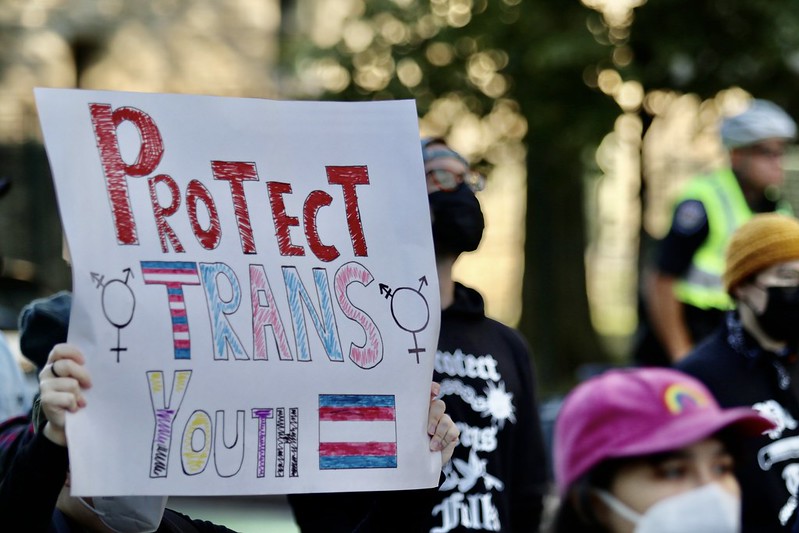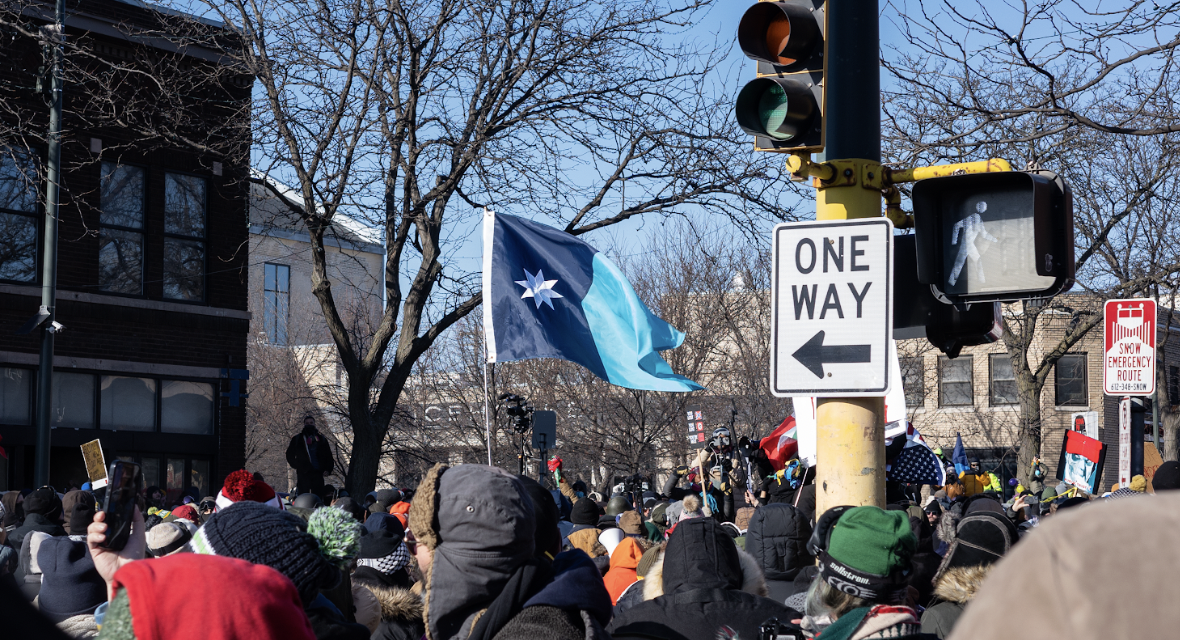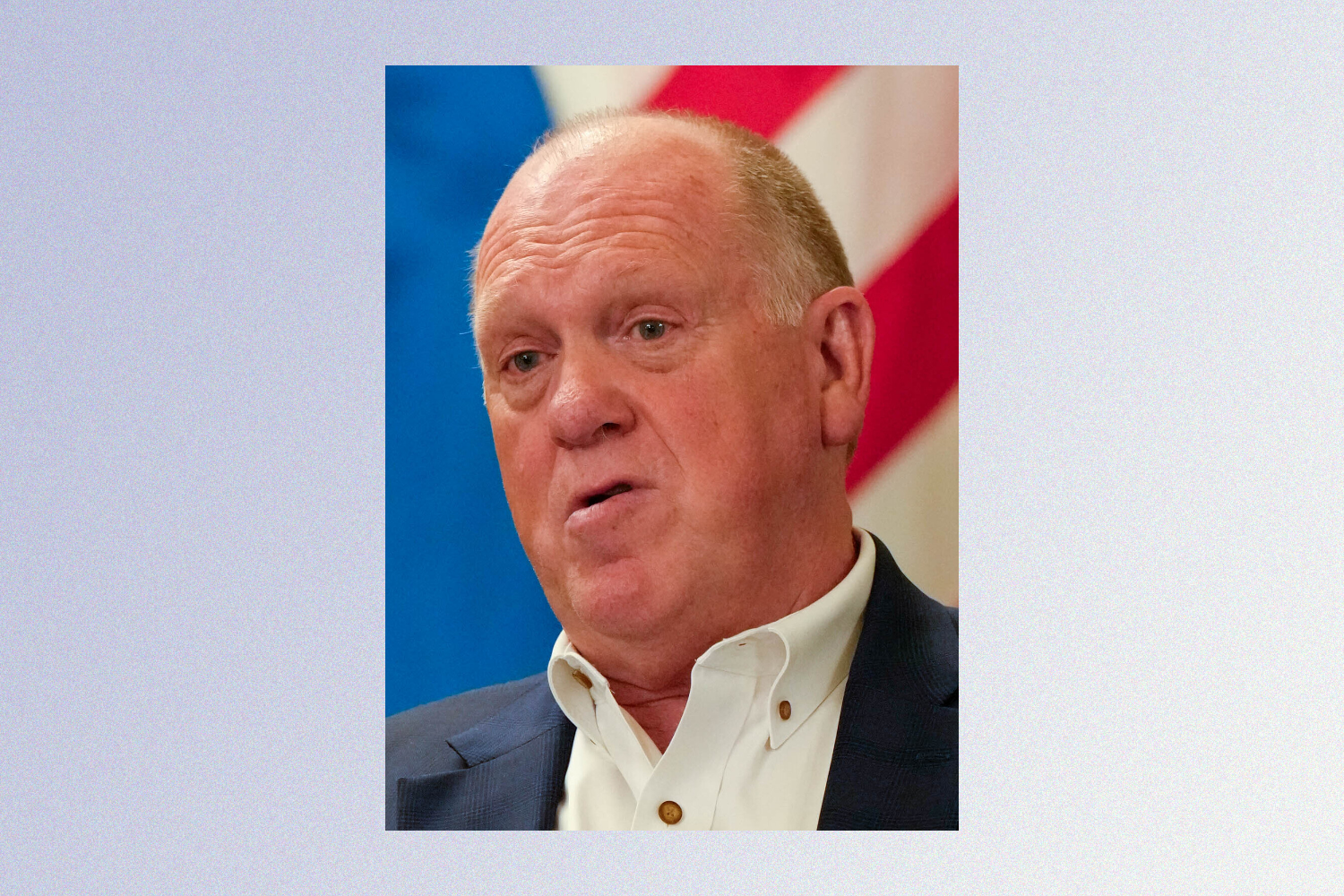If you spend any time in local online forums these days, you’ll find queer and trans people wondering aloud about coming to Minnesota. “I’m considering moving to Minneapolis or St. Paul…” their posts begin, before outlining the specific circumstances: I have a trans daughter; I can’t get gender-affirming care in my state; I live in Florida and I don’t feel safe here. They ask about the best neighborhoods for queer families, or advice for finding trans communities here, or the severity of the winters.
A record number of anti-LGBTQ+ bills—at least 510—were introduced across the nation last year, according to the American Civil Liberties Union. So far this year, the ACLU is tracking 478 bills. And while Minnesota is not immune, with 13 such bills introduced in the Legislature this session, it is a relative safe haven, especially after banning conversion therapy and establishing the state as a trans refuge last year.
It’s never been entirely safe to be a queer or trans person in America. But some places are at least safer, especially within the last few years, as more and more states introduce and pass laws targeting LGBTQ+ rights.
What’s it like when you actually uproot your life in pursuit of acceptance? We sat down with three families who’ve made the move to Minnesota within the last year, hoping that the state really is a refuge.
“My biggest regret is not doing it 20 years ago.”
For years, Matthew and Jorge Giandoni lived a mostly comfortable life in the suburbs of Dallas, Texas. They had nice neighbors and a big family—the couple adopted five siblings ages 1 through 12 in 2019—and a community that included other same-sex couples they’d met through fostering. They’d recently moved to a larger house, with a nicer lawn and better schools. It felt like starting fresh.
“We certainly lived in a big bubble,” Jorge says. “The Dallas area is pretty large, pretty diverse. It doesn’t necessarily represent your stereotypical Texas values.”
Sure, there were small things. Kids would occasionally make comments. There was a friend who wasn’t allowed to come to their house, an incident during a Spanish class trivia game played on smartphones where a few classmates set their usernames to a variation of “gavinhas2dads.” Nothing the Giandonis felt they couldn’t handle.
But as the national socio-political climate shifted over the last several years, the changes felt especially pronounced in Texas. “It just became like a sign of pride to be hateful, to make all these public accusations on how you should only follow one certain lifestyle,” Jorge says.
During the 2023 session, the Texas Legislature filed more than 100 anti-LGBTQ+ bills, more than a fifth of that kind of legislation nationwide: a version of Florida’s infamous “Don’t Say Gay” law, bathroom bills, House Bill 623—known as the Preservation of Sovereignty and Marriage Act—which would have prevented government employees from recognizing, granting, or enforcing same-sex marriage licenses.
“There was one where they made it so chaplains or priests from churches—without credentials—could become counselors at schools,” Matthew says.
“That one passed, actually,” adds Jorge. “That really made me feel like, ‘We need to get out of here.’”
Over time, the small things started to feel bigger. Taken individually, these were injustices they could stomach, but they added up to something seriously sinister. What was once concern that moving would disrupt their kids’ lives became a nagging fear about what might happen if they stayed.
The Giandonis thought they could wait until their kids—at least the three eldest—were out of high school before fleeing the state. That started to feel too far away.
“It just got so extreme that we started thinking, ‘What are we doing here?’” Jorge says. “We’re paying a lot of taxes to a system that doesn’t want us.”
They initially considered a move to Washington state or Colorado. They wanted an outdoor climate that was conducive to year-round activity and a political climate that was friendly to LGBTQ+ families. “Minneapolis kept coming up, how people are so happy, and they’re fit—I was like, ‘Why are people so happy there?’” Matthew laughs.
Education, happiness, wellness, LGBTQ friendliness—on all these things and more, Minnesota ranks near the top. But it was the Twin Cities Queer Hockey Association that really sealed the deal; a few years ago, the couple had taken up hockey along with two of their sons. “I’m like… I want to play gay hockey!” Matthew recalls.
They made the move to Wayzata last June, and had their first Queer Hockey practice the next month. They’ve been playing basically every week since, along with a number of other queer and trans transplants.
“My biggest regret is not doing it 20 years ago,” Matthew says. He explains that he and Jorge grew up in Clinton's "Don't Ask, Don't Tell" '90s, when they were encouraged to keep their heads down and mouths shut, and everything would be OK. That had been working for them. Then, “You come here, and everyone’s living loud and proud. Like, what in the world is going on? I’ve never seen so many ‘Black Lives Matter’ or ‘Everyone Is Welcome Here’ signs in front yards.”
“This hockey teammate, she was saying that she hates the cold, she hates the winter. But her safety comes first,” Jorge says. “And she knows that here, she can be safe, and she can be who she is without being judged.”
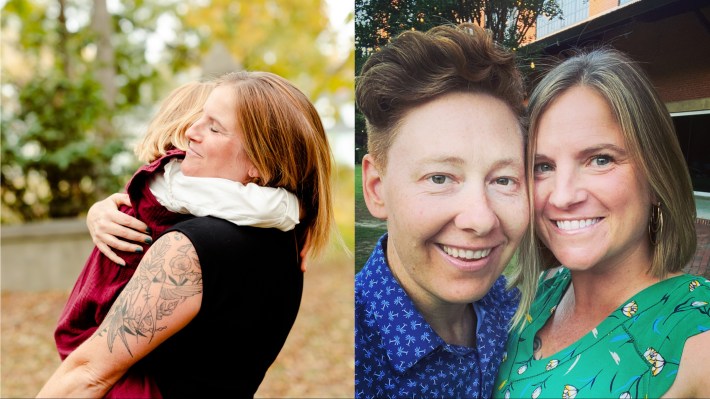
“That is not the life I want for my kid.”
In an especially “life at the end of the world” turn, Anne Sutkowi-Hemstreet and her wife, Allyson, have fled two different U.S. states—one due to climate disaster, and one due to anti-LGBTQ+ persecution.
The Sutkowi-Hemstreet family lived in Durham, North Carolina, in the early 2010s, before moving back home to California with their two kids, today ages 4 and 7, to be closer to family. But every year, there were the encroaching wildfires, the evacuations.
“Like, flames on the hills,” Anne says. “We had our cars parked in a certain way so we could exit quickly. Our power was out all the time. Total Parable of the Sower.”
She and Allyson liked California's politics, but it’s a notoriously expensive place to live, and the worsening blazes were an ongoing cause of concern. So, in 2021, they decided that even though North Carolina isn’t the friendliest place to be a queer couple, they’d move back East. “We were like, we think our kids will be OK, let’s do it. We can have a good life there,” Anne says. Durham is a relatively progressive oasis in a sea of red, and at least flames wouldn’t be licking at their door.
Then came the flurry of anti-LGBTQ+ legislation. There’s now a ban on gender-affirming care for kids under 18. Legislators have outlawed discussion of sexuality and gender identity from public school classrooms. Trans women and girls are barred from playing on sports teams that align with their gender identity.
Anne had been involved in advocacy work in North Carolina, where she was the founder and director of Rainbow Collective for Change, a grassroots organization working to make equitable spaces for LGBTQ+ youth and families. “I was ready to stay and fight,” she says.
But their 7-year-old is nonbinary, and “most of the schools in the area that I talked to, they were not respecting pronouns, they were misgendering kids,” Anne says. “That is not the life I want for my kid.”
So when Allyson was applying for university jobs, she looked for areas with welcoming public schools and legislation that supported gender-diverse kids. When she was offered a teaching position at the University of Minnesota, they decided to make the move. Minnesota felt like somewhere the laws would protect their kids; it seemed generally easier to raise a family here.
It wasn’t a simple decision. They’ve now had to pick up and move across state lines twice, which isn’t easy on young kids. Making a new community is tough anywhere, and moving is expensive. The couple is renting right now and looking to buy, but it’s not a great time to purchase a new house, and there’s a balancing act there, too. They might be able to get more house for their money in, say, Eden Prairie, but will those schools stay reliably progressive?
Still, Anne feels lucky. She landed the role of program director with Minnesota LGBTQ+ mentorship program QUEERSPACE Collective two months prior to the move and feels connected to a community already. And it’s worth it to watch their kids learn in an environment where, if they share their pronouns, the teacher will share theirs back.
“My kid has five people in their class that use they/them pronouns, so it’s like, no big deal here. Oh my god, it’s amazing,” Anne says. “The first day of school, they came home and said, ‘It feels so good to have more than just me using they/them pronouns in my class.’”
Not long after making the move, she was moved almost to tears as she read about Minnesota's historic tally of progressive policy wins from the 2023 legislative session: free school lunches, paid sick and safe time, drivers licenses for all. “I’m moving somewhere that cares about the people who live here,” she remembers thinking.
She hasn’t second-guessed the change once, and in fact she’s in contact with a number of other North Carolina families who are considering coming to Minnesota for safety.
“Minneapolis is on peoples’ shortlists, like, ‘When it gets bad enough, this is where [we’re going],’” she says, adding that it’s why, in both her personal and professional life, she’s been keeping track of resources for new LGBTQ+ families, particularly those with trans and nonbinary kids. “Maybe I can make it a little easier for the next family who moves up here.”
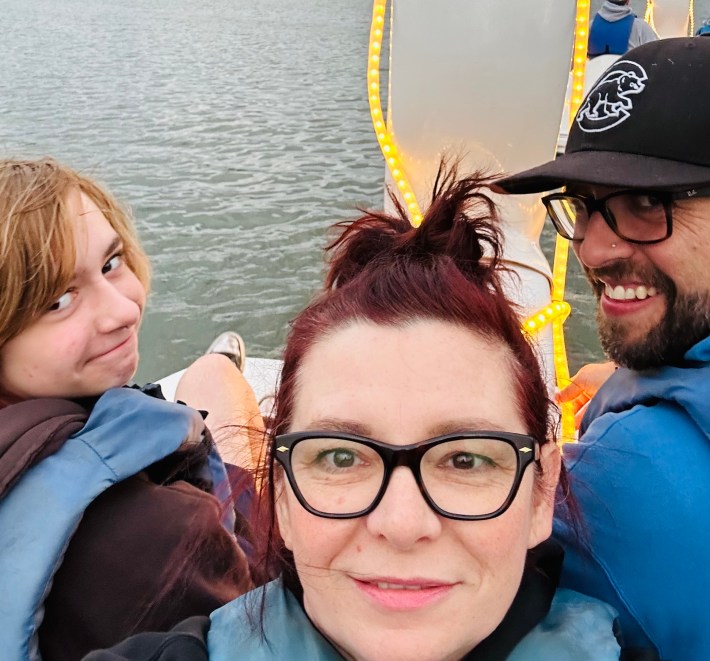
“It all happened really fast.”
In her Iowa community, Sherry Martin was on the board of the League of Women Voters and served on two school committees. She had just been asked to run for School Board; she was also getting ready to run for Chair of the Democratic Party.
“Moving was not even on our radar,” she says.
But her son Olive, who is trans, had been receiving gender-affirming care for about a year and half when bills banning that type of care for people under 18 started rearing their heads. She and her husband Joshua had begun looking for places where they could continue his care, which is when they learned that their insurance would only cover gender-affirming care in the three nearby states that were trying to ban it.
“Then South Dakota passed [a ban]. And then Nebraska got through. We just—there was no way Iowa was not gonna pass it,” she says. (It did, last March.) “It was three weeks away from the election for me running as chair, and I had to talk to my husband and talk to our son.”
The Martins moved to Minneapolis from Iowa this past summer—a transition that was in no way frictionless.
“We faced so much pushback when we decided to leave, from people we thought would support us, angry,” Martin says. “I was told, ‘You have skin in this game. You need to stay here in Iowa and keep doing what you’ve been doing because you’re fighting for other students.’ It was like people didn’t really understand that it’s life or death for my son.”
Olive had come out as gay in third grade, and told his parents he was trans the following year. For his 12th birthday, Sherry and Joshua surprised him with a court order legally changing his name, so that he could go by Olive when he returned to in-person classes after the worst of the pandemic. “But it was just… horrible,” Martin says.
Olive was staying home from school two or three days a week, and when he did go, he spent most of the day in the counselor’s office. Teachers were reportedly not understanding.
“He came home probably three times a week,” Martin says. “He went to the bathroom once and was cornered by three boys. When we started talking about it, it was kind of a no-brainer.”
The move was not without its anxieties; Olive in particular was a little worried about attending the Avalon School in St. Paul, which had smaller class sizes than he was used to. (At least in a big school, he reasoned, he could put some distance between himself and kids who bothered him.) The Martins also had their doubts about Avalon, a charter school with a lottery to get in, even if it did have a social-justice based mission.
In a slight hiccup, Olive has a bit of a trek to get to school: Avalon is in the St. Anthony Park neighborhood of St. Paul, and the Martins moved to northeast Minneapolis, near St. Anthony Village.
But overall, Martin says, it’s been tremendous. They’ve seen their son’s curiosity and love for learning blossom, along with his confidence.
“He absolutely loves it. It used to be dread every day taking him to school, he just didn’t want to go,” she says. “The attitude there was, ‘If you’re called a slur, just ignore it. Just shut up and take it,’ and that would never happen here.”
Everything about their lives is different these days. As the state leader for the LGBTQ+ nonprofit Free Mom Hugs in Iowa, Martin had to monitor their social media accounts for hate speech; as a state leader for Free Mom Hugs in Minnesota, she doesn’t. Even doctors have been more accepting—in Iowa, Olive had to go to therapy for over a year before he could get hormones, but they found he doesn’t need to fight so hard for care since moving to Minnesota.
“It’s such a better environment for all of us,” Martin says. “We went ice skating in the middle of the day last week, and there were two or three other trans people there with ‘trans joy’ sweatshirts on. You don’t have to be afraid to wear that up here.”
